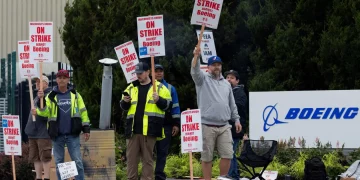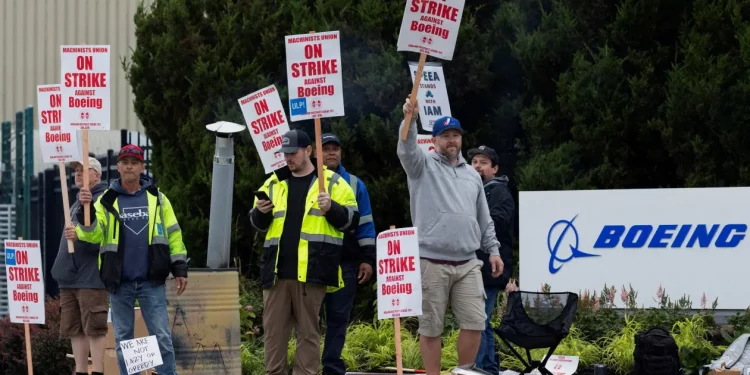Boeing is grappling with escalating costs as a machinist strike continues in Washington state, pushing for higher wages. If an agreement is not reached soon, the financial impact could become even more severe for the aerospace giant.
At the factory just outside Seattle, where Boeing produces its top-selling planes, workers have taken to the picket lines. Many are preparing for a long standoff, with some already picking up side jobs in landscaping, furniture moving, and warehouse work to cover expenses.
This strike, now entering its second week, has halted production across several key sites in the Pacific Northwest. Though the exact financial toll remains uncertain, analysts warn that a prolonged strike could further damage Boeing’s already fragile financial standing. The company, carrying a $60 billion debt load, has been burning through cash and is at risk of facing a credit downgrade if the strike drags on.
Union members are standing firm, with more than 30,000 machinists walking off the job after rejecting a labor deal by an overwhelming 95% margin. Despite a proposed 25% wage increase over four years, workers are holding out for higher raises, annual bonuses, and the reinstatement of pensions that were lost over a decade ago.
The rising cost of living, especially in the Seattle area, where home prices have soared 142% in the past decade, is a major factor driving the demand for better compensation. “We love what we do, but the wages just haven’t kept up with the cost of living,” said Jake Meyer, a Boeing mechanic who is now considering side work during the strike.
The company has been unable to turn a profit since 2018 and has been hit by multiple manufacturing crises. Boeing CEO Kelly Ortberg, who took the helm just six weeks ago, is scrambling to manage the fallout, having announced temporary furloughs for tens of thousands of staff as part of broader cost-cutting measures.
The company’s leadership remains hopeful that an agreement can be reached. However, negotiations with the union have made little progress, and the strike fund for workers, offering $250 a week, may not be enough to sustain families for long.
With the cost of the strike estimated at $50 million per day, Boeing’s network of suppliers is also feeling the strain, as many have been told to halt shipments. The tight labor market further complicates matters, as skilled workers are in high demand and difficult to replace.
Both the union and Boeing are under pressure to reach a deal soon, with government officials, including Transportation Secretary Pete Buttigieg, urging a swift resolution.
As Boeing navigates through this challenging period, its long-term prospects will largely depend on how quickly it can find common ground with its workforce. The strike is just one in a growing wave of labor disputes across the country, reflecting broader worker dissatisfaction in sectors ranging from entertainment to auto manufacturing.























